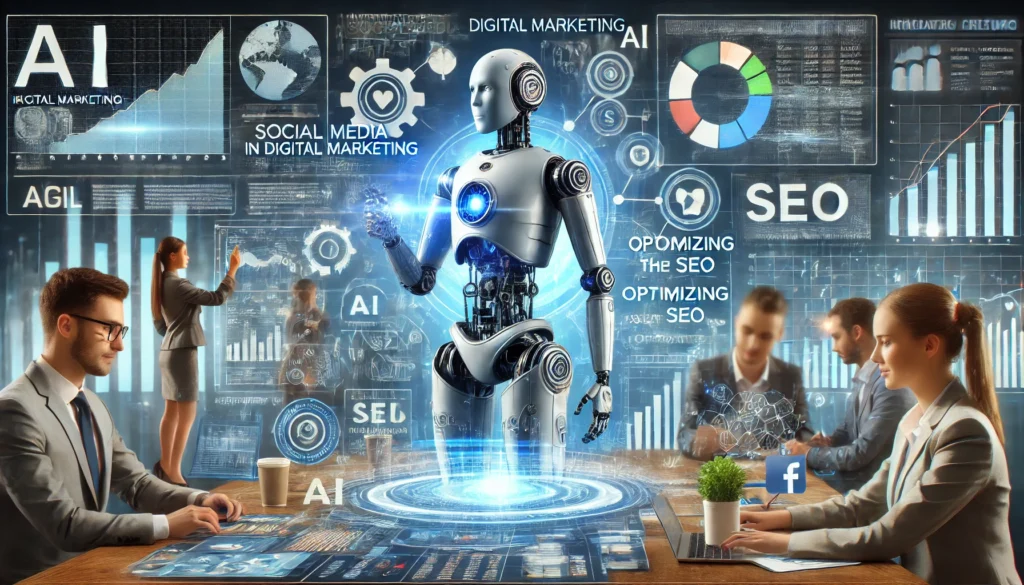AI in Digital Marketing: Transform Your Strategy
Artificial Intelligence (AI) has revolutionized various industries, and digital marketing is no exception. The integration of AI in digital marketing strategies has opened new avenues for businesses to enhance customer experience, improve ROI, and streamline their operations. This blog will explore the role of AI in digital marketing, its practical applications, and the pros and cons of incorporating AI into your marketing strategy.
24/11/2023
Digital Marketing
What is AI in Digital Marketing?
Definition and Overview
AI in digital marketing refers to the use of artificial intelligence technologies to automate tasks, analyze data, and create more personalized marketing experiences. AI can process large amounts of data quickly and provide insights that help marketers make data-driven decisions.
Key Concepts and Technologies Involved
- Machine Learning (ML): Algorithms that learn from data and improve over time.
- Natural Language Processing (NLP): Enables machines to understand and respond to human language.
- Computer Vision: Allows machines to interpret and make decisions based on visual data.
- Predictive Analytics: Uses historical data to predict future outcomes and trends.
Historical Context
The journey of AI in marketing started with simple automation tools and has evolved into sophisticated systems capable of natural language processing, image recognition, and predictive analytics. Milestones such as the advent of machine learning and deep learning have significantly advanced AI’s capabilities in digital marketing.
Evolution of AI in Marketing:
- Early Automation: Basic tools for automating repetitive tasks like email marketing.
- Introduction of Machine Learning: Improved targeting and personalization.
- Deep Learning Breakthroughs: Enhanced capabilities in data analysis and content generation.
How Do Digital Marketers Use AI?

AI Tools Used in Digital Marketing
Digital marketers use various AI tools to enhance their strategies. Some popular AI tools include:
- Chatbots: For customer service and engagement. Examples include ChatGPT and Drift.
- Predictive Analytics: Tools like Google Analytics and HubSpot use AI to forecast trends and customer behaviors.
- Content Creation Tools: Platforms like Jasper and Copy.ai generate and optimize content.
- Ad Targeting Platforms: Google Ads and Facebook Ads use AI for delivering personalized advertisements.
These tools not only save time but also provide valuable insights that can improve marketing efficiency.
AI in Marketing Examples
Several companies have successfully implemented AI in their marketing strategies. For instance:
- Netflix: Uses AI to recommend shows and movies to its users based on their viewing history, improving user engagement.
- Amazon: Employs AI for personalized product recommendations, enhancing the customer shopping experience and driving sales.
- Spotify: Utilizes AI to create personalized playlists and recommendations, keeping users engaged with the platform.
Ways to Use AI in Digital Marketing
Personalization and Customer Segmentation
AI helps in creating highly personalized marketing campaigns by analyzing customer data and behaviors. It segments customers based on various criteria, allowing marketers to tailor their messages to specific audiences. This results in more relevant and effective marketing efforts.
Techniques for Effective Customer Segmentation:
- Behavioral Segmentation: Grouping customers based on their actions and behaviors.
- Demographic Segmentation: Segmenting based on age, gender, income, etc.
- Psychographic Segmentation: Considering lifestyle, values, and interests.
Predictive Analytics and Insights
AI-powered predictive analytics can forecast future trends and customer behaviors, enabling marketers to make proactive decisions. By analyzing past data, AI can identify patterns and predict outcomes, helping businesses stay ahead of the competition.
Leveraging AI for Predictive Analytics:
- Customer Lifetime Value (CLV) Prediction: Estimating the total value a customer will bring over their lifetime.
- Churn Prediction: Identifying customers at risk of leaving and creating strategies to retain them.
- Sales Forecasting: Predicting future sales trends to inform inventory and marketing strategies.
AI Digital Marketing Pros and Cons
Pros of AI in Digital Marketing
1. Increased ROI
AI enhances return on investment by optimizing marketing campaigns and ensuring that resources are allocated efficiently. Case studies have shown significant ROI improvements with AI-driven marketing strategies.
2.Speed and Efficiency
AI-driven automation speeds up marketing processes and reduces the time required for repetitive tasks. This efficiency allows marketers to focus on strategic activities.
3.Efficiency Gains:
- Automation of Email Campaigns: Reducing time spent on manual email scheduling.
- AI-Powered Analytics: Faster data analysis and report generation.
4.Better Customer Experience
AI improves customer interactions by providing personalized experiences and timely responses. Examples include personalized emails, product recommendations, and chatbots that provide instant support.
5.Enhanced Customer Journeys:
- Personalized Emails: Increased open and click-through rates.
- AI Chatbots: Providing 24/7 customer support and instant responses.
6.Data-Based Marketing Decisions
AI enables data-driven marketing decisions by analyzing vast amounts of data and providing actionable insights. This approach ensures that marketing strategies are based on real-time data and accurate predictions.
Examples of Data-Driven Strategies:
- Optimizing Ad Spend: Allocating budget to the most effective channels.
- Content Performance Analysis: Identifying top-performing content and replicating its success.
Cons of AI in Digital Marketing
1.Content Quality and Accuracy
While AI can generate content, maintaining high-quality and accurate content can be challenging. Marketers must continuously monitor and refine AI-generated content to ensure it meets standards.
Challenges and Solutions:
- Monitoring Quality: Regular reviews and edits by human editors.
- Ensuring Accuracy: Fact-checking and using AI as a supportive tool rather than a replacement.
2.Privacy Concerns
AI’s use of customer data raises privacy issues. Marketers must adhere to data protection regulations and implement best practices to ensure customer data is secure.
Addressing Privacy Issues:
- Regulatory Compliance: Following GDPR, CCPA, and other regulations.
- Data Security Practices: Implementing robust security measures to protect customer data.
3.Copyright Concerns
AI-generated content can sometimes lead to copyright issues. It’s essential to navigate these concerns carefully and ensure that AI tools are used ethically.
4.Strategies for Ethical AI Usage:
- Clear Attribution: Giving credit where due.
- Ethical Content Generation: Using AI tools responsibly and ethically.
5.Evaluating Non-Quantifiable KPIs
AI struggles to measure qualitative outcomes, such as brand sentiment and customer satisfaction. Marketers need to complement AI insights with human judgment to evaluate these non-quantifiable KPIs effectively.
Approaches for KPI Evaluation:
- Combining Quantitative and Qualitative Data: Using surveys and feedback alongside AI metrics.
- Human Analysis: Incorporating human insights into AI-generated reports.
FAQs or Additional Insights
ChatGPT can be a valuable tool in the workplace for tasks such as drafting emails, generating content ideas, and providing customer support. Integrating ChatGPT into daily operations can enhance productivity and efficiency.
Practical Applications:
- Drafting Emails: Quickly generate email drafts and templates.
- Content Brainstorming: Use ChatGPT for brainstorming content ideas.
- Customer Support: Implement ChatGPT as a chatbot for instant customer assistance.
AI is transforming digital marketing by enabling more personalized, data-driven strategies. It allows marketers to predict trends, automate tasks, and deliver targeted content, ultimately driving better results and customer satisfaction.
Future Trends and Predictions:
- Enhanced Personalization: Greater use of AI for individualized marketing experiences.
- Advanced Analytics: More sophisticated analytics tools powered by AI.
AI-Driven Creativity: Increased use of AI in creative processes, such as content creation and design.
Also Read
Future-proofing your content requires a strategic shift:
- Monitor emerging platforms (like TikTok, Threads, and Reddit)
- Use trend tools like Exploding Topics, Google Trends, Glimpse, and BuzzSumo
- Perform intent analysis on evolving keywords
- Invest in evergreen plus predictive content hybrids
- Create adaptable content frameworks that can be updated quickly
Focus on topic clusters that can scale as the trend grows.
